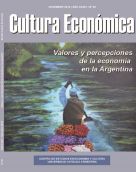Economic ideology : a comparison between hispanic and anglo-saxon nations
Keywords:
Economic Ideology, Capitalism, Anglo-Saxon Culture, Hispanic CultureAbstract
This paper seeks to compare and contrast the economy’s perception within Hispanic American countries and Commonwealth nations. The World Values Survey, represents the ground base of the work that shows the main features of economic mentality. The survey’s questionnaire reveals whether there is a pro-capitalist or anticapitalist perception, which is defined as a favorable attitude towards economic freedom, internal and external competition, initiative and private business management and the concept of market as a wealth creator. Argentina, Chile, Mexico, Peru and Uruguay have been selected to represent Latin America, and the results are compared to the survey’s outcomes in United States, New Zealand and Australia. The collected information allows the author to conclude that Anglo-Saxon countries show a greater acceptance and appreciation of market economy than its perception in Latin America, a phenomenon that seems to have increased even more in the first three decades of the new millennium.Downloads
References
AA.VV (2016) The Global Competitiveness Report 2015-2016. World Economic Forum, http://reports.weforum.org/global-competitive-nessreport-2015 2016/competitiveness-rankings/ Último acceso: diciembre 2016.
Alberdi, J. B. (1876). La vida y los trabajos industriales de William Wheelwright en la América del Sud. Librería de Garnier Hermanos, Paris.
Baker, Andy y Kenneth F. Greene (2011). “The Latin American Left’s Mandate: Free-Market Policies and Issue Voting in New Democracies”, World Politics, N°63; 1, pp. 43-77.
Berger, Peter (1990). “Observaciones acerca de la cultura económica”, Estudios Públicos N°40, pp. 11-30.
Czegledi, Pal (2014). “Is an Anti-Capitalistic Mentality Cultural? The Case of Hungarians Inside and Outside Hungary in the World Values Survey” en http: //papers.ssrn.com/sol3/papers.cfm?abstract_id=2524116. Último acceso: diciembre 2016.
GAUSSC (2006). Opiniones y actitudes antes y después del Tribunal electoral, en http://www.gaussc.mx/publicaciones/ago/2006_GAUSSC_Opiniones_y_actitudes_antes_y_despues_del_Tribunal_Electoral.pdf Último acceso: diciembre 2016.
García Hamilton, José I. (1984). El Autoritarismo y la Improductividad en Hispanoamérica. Emecé, Buenos Aires.
Global Entrepreneurship Monitor. (2014) Global Report, en http://www.gemconsortium.org/report. Último acceso: diciembre 2016.
Gómez, Alejandro y Carlos Newland (2014). “Alberdi, sobre héroes y empresarios”, Cultura Económica, N°86, pp. 30-37.
Hida, Hilton (1998), “Mejor malo conocido...” The Wall Street Journal Americas, en: http://interactive.wsj. com/americas/resources/documents/s-2esp.html Último acceso: diciembre 2016.
Kuchar, Pavel (2016). “Liberalism in Mexican Economic Thought, Past and Present”, EconJournal Watch 13(1) January: 129–167.
Corporación Latinobarometro (2013). Informe 2013. http://www.latinobarometro.org/documentos/LATBD_INFORME_LB_2013.pdf Último acceso: diciembre 2016.
McCloskey, Deirdre (2011). Bourgeois Dignity: Why Economics Can’t Explain the Modern World. University of Chicago Press, Chicago.
Moreno, Alejandro (2013) “La libertad de elegir: comparando América Latina con otras regiones del mundo”, en: Carballo, Marita y
Alejandro Moreno (coords.) El cambio de valores en América Latina. Hallazgos de la Encuesta Mundial de Valores. CESOP/ITAM, México,
pp. 85-125.
Pew Research Center (2014). “Faith and Skepticism aboutTrade, Foreign Investment”, http://www.pewglobal.org/files/2014/09/Pew-Research-Center-Trade-Report-FINALSeptember-16-2014.pdf. Ultimo acceso: diciembre 2016.
Phelps, Edmund S. (2006). “Economic Culture and Economic Performance: What Light Is Shed on the Continent’s Problem?”, Perspectives on the Performance of the Continent’s Economies. Conference of CESifo and Center on Capitalism and Society Venice
http://www.columbia.edu/~esp2/Center3rdAnnualConf2006Sept27.pdf.
Último acceso: diciembre 2016.
Plaza Pública Cadem (2015). Track semanal de Opinión Pública Nº 100 http://plazapublica. cl/wp-content/uploads/7u63456.pdf Último acceso: diciembre 2016.
Porter, Michael (2000). “Attitudes, Values, Beliefs and the microeconomics of Prosperity,” Culture Matters: How Values Shape Human Progress, (L.E. Harrison, S.P. Huntington, eds.). Basic
Books, New York, pp. 14-28.
S/A. (2015). “Que se piensa de los empresarios argentinos” 16/1/2015), Revista Apertura http://www.apertura.com/economia/Que-sepiensa-de-los-empresarios-argentinos-2015 01 16-0002.html Último acceso: diciembre 2016.
Salvatore, Ricardo (1993). “Market-Oriented Reform and the Language of Popular Protest: Latin America From Charles III to the I.M.F.” Social Science History, 17:4.
Seligson, Mitchell A.(2008).” El rol del Estado 00 preliminares_Maquetación 1 19/12/2017 02:46 p.m. Página 19 20 Año XXXIV ! Nº 92 ! Diciembre 2016 como creador de empleo”, Revista Ciencia Política Vol.28, Nº3, pp.209-218.
Veliz, Claudio (1984). La tradición centralista de América Latina. Barcelona, Ariel S.A.
Wiarda, Howard J (1978). “Corporatist Theory and Ideology: A Latin American Development Paradigm” Journal of Church and State
:1, pp. 29-56.
Zizumbo-Colunga, Daniel; Elizabeth J.Zechmeister, y Mitchell A. Seligson (n.d.). “Who supports Free Trade (and Why)?” Quarterly Americas. http://www.americasquarterly. org/node/2198. Último acceso: diciembre 2016.
World Bank (2016). “GNI per capita, Atlas method”. http://data.worldbank.org/indicator/NY.GNP.PCAP.CD/countries Ultimo
acceso: diciembre 2016
Downloads
Published
How to Cite
Issue
Section
License













